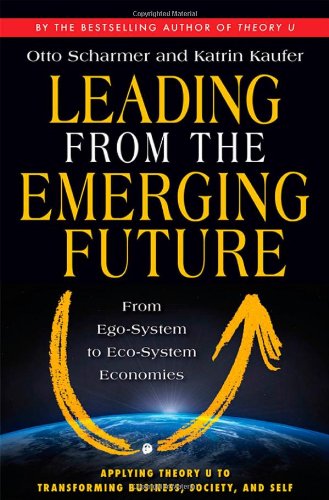 Today, we are in an age of disruption. Global crises challenge just about every aspect of society – finance, food, fuel, water, resources, poverty. The list goes on and on. Yet, this disruption brings the possibility of profound personal, societal and global renewal. We need to stop and ask: Why do we collectively create results nobody wants? What keeps us locked into the old ways of operating? And, perhaps most importantly, what can we do to transform these patterns that keep us locked in the past?
Today, we are in an age of disruption. Global crises challenge just about every aspect of society – finance, food, fuel, water, resources, poverty. The list goes on and on. Yet, this disruption brings the possibility of profound personal, societal and global renewal. We need to stop and ask: Why do we collectively create results nobody wants? What keeps us locked into the old ways of operating? And, perhaps most importantly, what can we do to transform these patterns that keep us locked in the past?
Ego 2 Ego Book: The essential challenge of our time
Solving today’s crises is only possible if we transform the prevalence of ego-system awareness with a new framework of economic action and thought that is based on ecosystem awareness. This is a revolutionary change in that we need revolution of economic thought from ego to eco, revolution of relationships from reactive to co-creative, and revolution of institutions from hierarchical entities to co-creative ecosystem economies.
The main shift is from organizing around special interest groups to organizing around global commons or global ecosystems to generate well-being for all.
I’ve spent the last 18 years studying this growing disruption and potential for transformation. In a new book I’ve written with Katrin Kaufer, Leading from the Emerging Future: From Ego-System to Eco-System Economies, we lay out new economic frameworks, methods and tools that can help leaders and change-makers guide this transformation.
One of the first steps in this transformation is understanding how our current crises constitute three divides: ecological, social and spiritual-cultural. The ecological divide refers to the depletion of our natural resources on a massive scale. The social divide refers to increasing rates of inequity, poverty and social polarization. And the spiritual-cultural divide refers to rising rates of burnout, depression, distraction, busyness, and–in spite of ever more consumption–unhappiness.
We attribute these divides to many systemic disconnects, such as between the infinite growth imperative and our finite resources, between the haves and have nots, between institutional leadership and people, between gross domestic product and well-being, and between technology and real societal needs.
I see the shift from ego-system to eco-system awareness as the central leadership challenge of our time. By going through this shift, we transform our institutional structures from what in the book we call society 3.0 to society 4.0.
I have seen the ego-system beginning to crumble in many important places around the world. It’s not so black and white nor is it the only game in town. I’ve also seen it crumbling in the U.S., particularly in the Millennial Generation, which tends to favor a more lifestyle-based approach anchored in social and community spaces. And I’ve seen MIT Sloan Fellows who are mid-career executives looking to be part of a bigger narrative to have greater impact on well-being. The old mindset is clearly starting to hit a wall.
As we collectively advance this shift from ego to eco throughout all our key institutional systems, it is essential to form a global leadership school that can provide helping infrastructres for building the new leadership capacities and transformation literacy that is called for now. We call this U.school in our book, but it’s essentially a landing place for a new generation of leaders and researchers so that we have hot spots across the world of communities that focus on and research this economic transformation, sharing lessons in real time.
Already, several U.school initiatives, labs and programs are being seeded around the globe in places like Bhutan, China, Indonesia, the Philippines, India, South Africa, Egypt, Brazil, Europe and North America. An example is the Global Well-Being and Gross National Happiness (GNH) Lab, which we cofounded earlier this year with our founding partners from the GIZ Global Leadership Academy (German Ministry for Economic Development and Cooperation) and Bhutan’s GNH Center. The Lab is exploring new ways of measuring and implementing well-being and progress in societies around the world.
The door of possibility is wide open. We have a global movement in the making, living examples, and an emerging set of frameworks, methods and tools. Now its on us to make up our mind whether we want to go through that door…
Otto Scharmer is a senior lecturer at MIT Sloan, founding chair of the Presencing Institute and coauthor of Leading from the Emerging Future: From Ego-System to Eco-System Economies with Katrin Kaufer, which was released this summer.
Leading from the Emerging Future; From Ego-System to Eco-System Economies by C. Otto Scharmer



